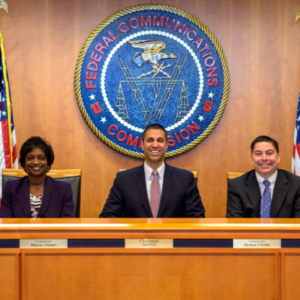The Federal Communications Commission voted to advance a plan to scale back net neutrality rules passed under the Obama administration Thursday, officially starting the countdown clock to what could be a significant repeal later this year.
Commissioners voted 2-1 to pass FCC Chairman Ajit Pai’s “Restoring Internet Freedom” Notice of Proposed Rulemaking (NPRM) aimed at rolling back authority the agency uses to police monopolies and hearing comment on what to do with the core net neutrality rules against web traffic blocking, throttling, and paid prioritization.
“This is the beginning of the process, not the end,” Pai said during the FCC’s open meeting Thursday, “The FCC is simply seeking comment on these proposals, which draw on the Clinton-era light-touch approach. They also ask questions about the existing bright-line rules. Over the next 90 days, the American public will have chance to share its views on them.”
The Republican chairman’s plan to roll back the 2015 Open Internet Order does three things at its core: First, it reverses the order’s reclassification of internet service providers (ISPs) like AT&T as “common carriers,” or public utilities under Title II of the Communications Act. That authority was originally created to break up the Bell telephone monopoly and gives the FCC the potential power to regulate prices.
Second, it eliminates the internet conduct standard that grants the agency general power to police practices by ISPs the agency deems unfair. The previous administration used it to go after zero-rating offers by AT&T and Verizon for alleged price discrimination.
Third, and perhaps most important, is the fate of the bright-line rules. That’ll presumably be left up to public over the next three months as the agency hears comments. It’s worth noting Pai and Republican Commissioner Michael O’Rielly have both expressed support for paid prioritization deals similar to the peering agreements Netflix inked with AT&T, Verizon, and Comcast before the rules were passed.
Passage of the NPRM brings Pai one step closer to his ultimate goal of reclassifying broadband as a Title I information service, and returning oversight of internet providers to the Federal Trade Commission’s lighter-touch jurisdiction, where it resided from the Clinton administration through 2015.
In keeping with his commitment to making the agency’s rulemaking process more transparent, Pai said he’ll “go one step further and publicly commit to” releasing the final order before the FCC votes on it later this year. The previous administration didn’t release its net neutrality NPRM or final order until after commissioners had already voted on them.
“You may agree or disagree with what the FCC is doing, but you have been and will be able to see what it is we’re doing and why,” the chairman said.
Mignon Clyburn, the only Democrat and commissioner left on the FCC, who voted for the rules, blasted the Republican plan in a lengthy 20-plus minute dissent.
“Today’s [NPRM] more appropriately should be known as the ‘Destroying Internet Freedom’ NPRM,” Clyburn said. “If ratified, it will deeply damage the ability of the FCC to be a champion of consumers and competition in the 21st century.”
The Democrat said despite other pledges Pai has made to let innovation and economics drive the agency, not a single economist or technologist contributed anything to his net neutrality plan — criticisms Pai himself leveled at the Obama administration’s proposal.
“Will any of the open internet rules survive this rulemaking? I am doubtful given both the tenor, the questioning, and the fact that the rulemaking is proposing the only authority that would underpin strong open internet rules,” she speculated.
Pai responded to Clyburn saying the agency will do a cost-benefit analysis of the rules, and “rely not on hyperbolic statements about ‘the end of the Internet as we know it’ and 140-character commentary, but on the data.”
Members of the broadband industry including Comcast and USTelecom, the trade group that sued the FCC over the last net neutrality proceeding, predictably celebrated Thursday’s vote.
“The FCC is moving the conversation beyond the merits of net neutrality to how best to safeguard this universally embraced value with a modern, constructive policy framework,” USTelecom CEO Jonathan Spalter said.
Comcast Vice President and Chief Diversity Officer David Cohen said despite “the multiple mischaracterizations of the FCC intentions, this is not a proceeding designed to eliminate enforceable open internet protections.”
“The purpose is to find a path to protect the openness of the internet without reliance on the dangerous and inappropriate Title II as the source of authority for such rules,” Cohen said.
Groups in favor of upholding the rules including Public Knowledge, whose co-founder and former president joined the FCC to help write the rules said Pai’s plan “would give broadband providers far more unconstrained power to manipulate internet traffic and customer behavior for profit.”
“This proposal paves the way to an internet dominated by vertical integration and opaque dealmaking between giant firms,” Public Knowledge General Counsel Ryan Clough said.
Others including AT&T and the center-right D.C. think tank TechFreedom said given the agency’s back-and-forth, Congress may be the only place to settle net neutrality once and for all.
“In 2015, a 3-2 majority of the FCC departed from decades of precedent to reclassify internet access,” AT&T Vice President of Federal Regulatory Joan Marsh said. “Now, a split FCC has begun the process of reversing that decision. Perhaps the only path to a clear and durable regulatory framework for internet access is through Congress.”
“FCC chair Ajit Pai doesn’t oppose net neutrality, as Oliver claims. Pai simply rejects the broader powers the FCC has claimed in the name of net neutrality. Only Congress can put net neutrality on a sound legal footing,” TechFreedom President Berin Szoka wrote in Wired Wednesday.
“Until Congress acts,” his op-ed reads, “telecom Groundhog Day will keep replaying over and over and over.”

